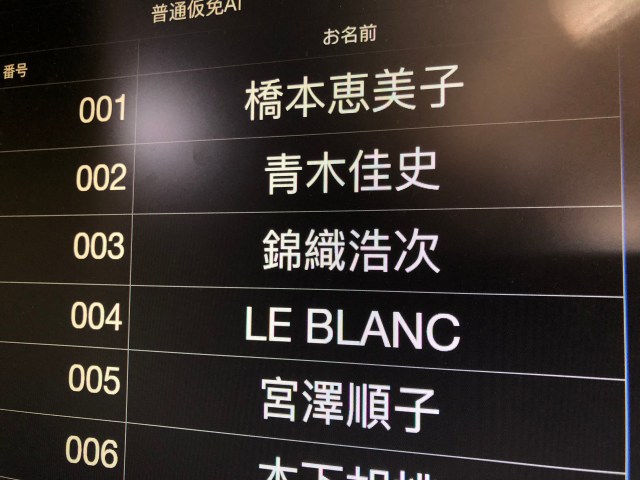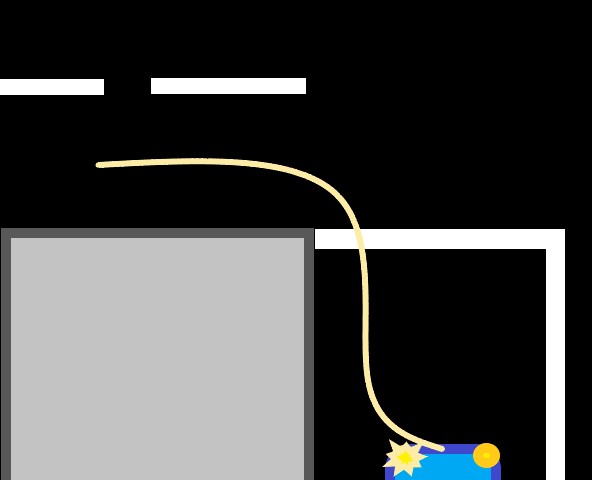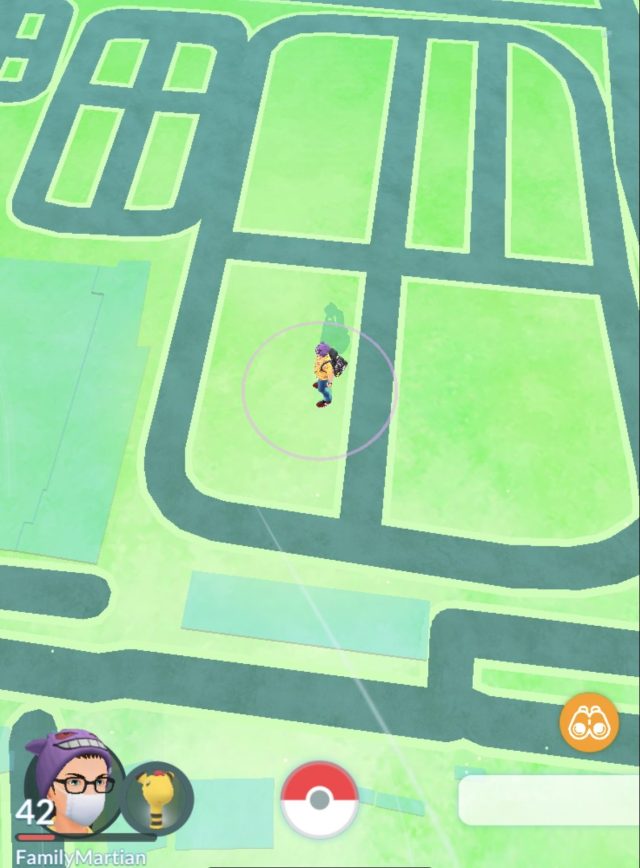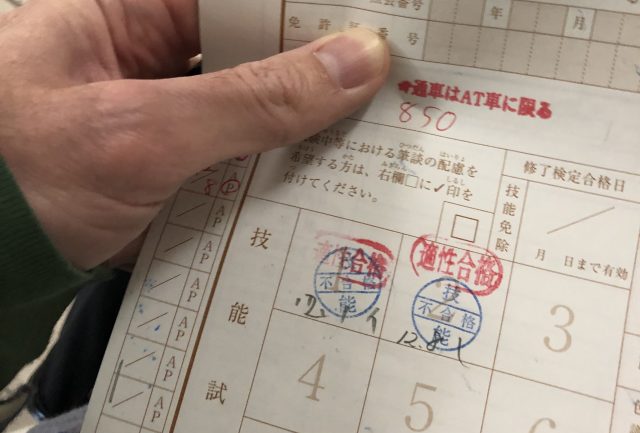Getting a driver’s license in Japan the hard way: The first driving test again

Dead man driving…
In my continuing effort to get a driver’s license in Japan in what is widely considered the hardest possible way, I have experienced first-hand why. It’s an incredibly strictly judged test with an unclear set of criteria needed to pass the exam, and that’s just to get a learner’s permit.
Nevertheless, I decided to take another crack at it the following week. To be perfectly honest, I felt I had no chance of passing it this time either, but in a strange way that was sort of liberating. The nervousness of the first exam had pretty much evaporated at this point, so at least I had that going for me. I had also learned some valuable strategies going into the next test, like “the line trick.”
・The Line Trick
On my first attempt at the test, I had the unfortunate luck of having to go first in the group. This meant that I wouldn’t even get a chance to watch another person take the test before I did, and pretty much had to go into the whole routine blind.

By this time, however, I realized that it actually had nothing to do with luck.
On the first day, I had gone in early in order to learn as much as I could beforehand, so I and many others were all hanging around the counter before it opened. A few minutes later, an employee came out to announce that the window was opening soon, and some people started to line up – but a lot of other people didn’t do anything. I thought that was strange at first, but by my second attempt I realized what was up.
The order that you take the test in is dictated by the order you check-in. Therefore, if you hang back a bit, you don’t have to go first. That being said, you don’t want to sit around all day waiting either, so it’s all about getting that sweet spot near the front but not right at it.
This is easier said than done though, because different people are taking different types of licenses, so I couldn’t quite know how many people in front of me were in the same group. In the end, I was about 15th in line and ended up fourth in my group, which was pretty good.

・Don’t drive, just move the car around the course
Like before, I watched the video and walked the course, but with an entirely new perspective about it. For starters, knowing the course really isn’t that important, because – and I’m going to write this in big letters because it’s probably the most important thing to know about this driving test:
This is not a driving test!
I probably shouldn’t have been surprised by this because it’s right there in the name: “Skill Test” (Gino Shiken). One of my mistakes when getting behind the wheel last time was trying to “drive” the car in the usual sense. By that I mean that when driving there’s a certain subconscious urge to try and keep a smooth flow of traffic going. That doesn’t mean driving fast per se, but not driving so slow that you become more of an obstacle than a fellow motorist on the road. But in this test it is important to completely kill that urge.
The main reason is that it’s a closed course and not very big. Driving even remotely normally makes it harder to perform all the necessary skills properly. For example, the reason I was told I failed last time was because I didn’t bring the car alongside the very edge of the curb before making a left turn, and when making a right turn alongside the very edge of the white line.

The process in this case is to signal your intention to turn, move the car over to the edge, stop at the line at the corner, and turn, all while checking mirrors and blind spots repeatedly. It’s not hard at all in principle, but the space to do everything in is rather limited, so it’s highly recommended to drive at a complete crawl, well below 10 kilometers per hour (six miles per hour) for the whole test except the one section where you’re told to speed up to 40 (25) or so.
It is far more important to focus on the individual skills themselves and just move between each one like you’re looking around for a space in a full parking lot.
Despite all that, I still wanted to commit the course to memory just to make it one less thing to worry about. Having to remember the growing checklist of minute actions was stressful enough and having to pay close attention to directions in a foreign language on top of that doesn’t help much.
▼ No one is supposed to take photos of the course, but here’s me walking through it on Pokémon Go

・The Ride Along
Now that I was fourth in line I had the luxury of watching other people take the test; the first two from the window of the waiting area and the third from the back seat of the car.
The previous time I could see that nearly everyone – if not everyone – had failed because we all ended up in the same place, but this time I could also see how well some other people did before failing…and it wasn’t good.
In one instance the car returned to the motor pool without even making a single left or right turn, so sufficed to say my turn came up rather quickly. But before that, I got to sit in the back seat while the woman before me took her turn.
She seemed to know the score and drove at a total snail’s pace, probably under 5 kilometers per hour (3 miles per hour) for a lot of it. However, she may have gone too slow because the examiner issued a few gruff warnings to go faster at a couple points. It was good for me to know his limits though, because the last thing you want is a grumpy examiner on your hands.
Oddly enough, she made it to almost the exact same point that I had failed last time when the examiner suddenly informed her that the test was finished and she had to return to the motor pool without completing the course. This was a little surprising because I didn’t notice her doing anything especially wrong. She flubbed a lane change slightly before making a right turn once but that happened way before the test was called off.
I’ll never know the answer either, because I had to exit the car while they discussed what happened. However, I could kind of glean from their gesturing that maybe she didn’t crank her head back enough when checking her blind spots.
・Not-So-Mellow Yellow
I then returned to the examination vehicle, both times it was the exact same make and model; a Camry I think but I was too preoccupied to notice. For some strange reason this time the seat on the car didn’t go back far enough. It was odd since at 175 centimeters (5’9′) I’m not a particularly tall person, but the examiner just apologized and told me to do my best.
Another interesting quirk about these cars is that sometimes they have two sets of sideview mirrors with the extra set positioned so the examiner can see exactly what you see. I usually like to point mine a little towards the ground so I can see what’s doing down there, but he told me I had to keep them straight back.

After hitting the course things seemed to go fine, but in the back of my mind I knew he was busy penalizing me for all sorts of clandestine infractions. I did, however, make sure to move the car right over to the side every time I turned.
In the center of the course is an intersection with working traffic lights to simulate real-world conditions. Examinees must pass through this about four times during the test if they can make it all the way, but when I approached it for the first time I could see the pedestrian signal blink. My heart sank because I knew I was heading right into a stale green light.
This meant that the light would turn yellow and then red right at the exact moment I was about to approach the intersection. In normal driving this is no big deal, but in a test like this where they’re just looking for ways to fail me, it’s pretty much the worst thing that could happen.
I knew speeding up would be signing my death warrant, but since I was driving at a way-below-average speed, putting through a yellow-turned-red light seemed equally bad. There wasn’t much time to think about it anyway, so I just maintained my speed going through and prayed to Vin Diesel it was the right call.
Sure enough, when I was a couple meters from the stopping line the yellow light appeared and because I was going so slowly it went red while I was still in the intersection. The test didn’t end though, so I guess I didn’t make a critical error at least. However, the route next took me in a loop around the northwestern quadrant right back into the central intersection, and wouldn’t you know it? The exact same Vin-damned thing happened!
Again, I just hurled obscenities around inside my head, went through the yellow steadily again, and just as I reached the other side of the intersection I heard the examiner calmly say, “Okay that’s it, let’s go back now.”
・One Point Advice
After returning to the start of the course, my backseat passenger left the car and I immediately moaned to the examiner, “Awww, it was the yellow lights, wasn’t it!”
He explained that it both was and wasn’t. The problem wasn’t exactly with how I handled the stale green but how I moved through the intersection. While passing straight through I failed to look both left and right, but that is something I would’ve been expected to do even if it was a regular clear green light. Honestly, I’m not sure if I would have done that on a normal green light anyway though. My normal habit would be to check the road going across with my peripheral vision as I approached it rather than turning my head left and right while going through it. That kind of feels more dangerous to me because I’m taking my eyes off the road in front of me.
Anyway, the logic here once again is to prevent collisions with bikes, because a cyclist could ignore their red light completely and run right in front of your vehicle. That might seem a little backwards, but I’ve lived here long enough to know that cyclists really do seem to lack an awareness of traffic lights and self-preservation for that matter. However, it was hard to ignore the irony that the reasons I keep failing are because of dangerous things that people on bikes do.
At least, I think these are the reasons I keep failing.
After the exam, the examiner points out one thing that you did to cause you to fail. This procedure is explained to us beforehand as our “One-Point Advice” because it is just one point. They don’t tell you all the other things you may or may not have done. That’s probably the most frustrating part of this whole ordeal. If I could get a laundry list of the things I did wrong, I could easily take the necessary steps to fix them and then pass the test.
I’ve heard many theories as to why the exam is set up this way. Some suggest that it’s basically a racket to get money out of people and/or persuade them to just go to driving school instead. Another interesting theory I heard was that they just want to see if examinees are taking things seriously enough to retake the test and improve their skills, so even if someone is a generally good driver they’ll get failed three or so times anyway.
▼ My stamps of shame

Either way, it is what it is and I had to seriously consider my options from here on out.
・What’s next?
Continuing this process I will only learn one thing at a time, and I’ll have to throw myself to the wolves Vin knows how many times until I learn everything I need to improve. In between, I can also continue to search the muddy pool of information online and try to find the needles in the haystack to apply to my situation.
There are other options too. Some schools offer crash courses (my poor choice of words, not theirs) that cover only a specific driving test in a couple of hours and tell you more precisely what you need to do. Prices can vary widely because of different setups like hourly rates or one-day courses but 10,000 to 20,000 yen ($88-$175) seems to be the ballpark for this kind of service. So it all boils down to a numbers game, because if I could pass the test in two or three more attempts I would still come out ahead cash-wise. The problem is that, I still don’t really know how many more things I need to know.
Just calling the whole thing off is also a very viable option. Japan’s public transportation is so tight that I can travel across the country without ever traveling more than one kilometer by foot from my front door. Not having a driver’s license isn’t the end of the world by any means, and that’s probably why a lot of younger Japanese people aren’t even bothering with it anymore.
It’s a lot to consider, but for the time being, I’m going to step away from this for the rest of the year at least. My passing score on the written test is valid for six months so I have until next May to figure something out. For now, however, I’ve got enough agita in my life and haven’t even been able to play Animal Crossing in weeks because of all this driving stuff. I heard that Isabelle the mouse moved away from the island while I was gone, and she was my favorite animal neighbor. I never even got to say goodbye, Vin-damnit!
Photos ©SoraNews24
● Want to hear about SoraNews24’s latest articles as soon as they’re published? Follow us on Facebook and Twitter!
Credit:




0 comments: